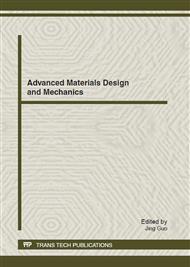[1]
Wang Zhiwen, Design of Chemical Container, Beijing: Chemical Industry Press, 1998, P222-227.
Google Scholar
[2]
Zhao Shaobian, Fatigue design, Beijing: Machinery Industry Press, 1994. pp.10-200.
Google Scholar
[3]
Yi Shuangzeng, Theory and Application of fracture damage, Beijing: Tsinghua University Press, 1992, pp.222-231.
Google Scholar
[4]
Li Jia, Ping An, etc., Intelligent Simulation System For Analysing Fatigue Life Reliability Of Material Under Random Loading, Journal Of Mechanical Strength, 2001, 23(1) : 19 - 21.
Google Scholar
[5]
Li Jia, Ping An, Wang Dejun, Analytical Model For End Milling Surface Geomeirical Error With Considering Intelligent Simulation Method For Analyzing Reliability Based On No-Steady Model Of Material Fatigue Damage, Chinese Journal Of Mechanical Engineering, 2001, 37(1) : 1-5.
DOI: 10.3901/jme.2001.01.001
Google Scholar
[6]
Schooling J, M Brown M Reed P.A.S. An example of the use of neural computing techniques in materials science - the modeling of fatigue thresholds in Ni-base super alloys[J]. Materials Science and English, 1999, A260 : 222 - 239.
DOI: 10.1016/s0921-5093(98)00957-5
Google Scholar
[7]
Gao Zhentong, Xiong Junjiang, Fatigue Reliability, Beijian: Beijing Aeronautics and Astronautics Press, 2000. 375 - 379.
Google Scholar
[8]
Zhao Yongxiang, Wang Jinnuo, Gao Qing, New Method For Strain-Based Fatigue Reliability Analysis, Chinese Journal Of Mechanical Engineering, 2001, 38(1): 27 – 30, 46.
Google Scholar
[9]
BS5500: 1997. British standard specification for unfired fusion welded pressure vessels. Annex C. UK: British Standards Institution.
Google Scholar
[10]
JB4732-95 analysis of steel pressure vessel design criteria, Beijing, (1995).
Google Scholar
[11]
Xiong Junjiang, Reliability of engineering fatigue fracture, Beijing: National Defence Industry Press, 2008:98-104.
Google Scholar
[12]
Hu, Guang Zhong, Zhang Liang Dong, etc., The Actualities and Development of Fatigue Reliability Design Methodsof Pressure Vessels, Advanced Materials Research Vols. 199-200 (2011) pp.559-563.
DOI: 10.4028/www.scientific.net/amr.199-200.559
Google Scholar
[13]
Li Shunming, Mechanical fatigue and reliability, Beijing: Science Press, 2006:78-88.
Google Scholar
[14]
Wang Guojun, Hurenxi, etc., nSoft fatigue analysis theory and application tutorial, Beijing: Machinery Industry Press, 2007: 3-12.
Google Scholar


